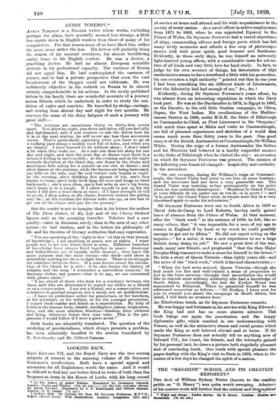LOOKING. BACK.
Knee EDWARD VII. and the Royal Navy are _the two central subjects of interest in the amusing volume of Sir Seymour Fortescue's recollections. Both have a special appeal and attraction for all Englishmen worth the name. .And it would be difficult to find any one better fitted to write of both than the Sergeant-at-Arms in •the House of -Lords, with _his long .record • (1) The Letters of Anton 2'chetior. Translated by .Constance ,Garnett. London : Matto and Windus. [12s. 6d. net.].—(2) My Life, and other Stories. By Anton Tchehov. Translated by S. S. Kotellansty-and ,Oilberrt Llasnan. London : C. W. Daniel. F7s. net.1 t Looking Back. By Captain the Hon. Sir Seymour Forteacue. x.e.v.o.. C.M.G. (Royal Navy). With Illustrations. London : Losonnans. MIL set.]
of service at home and abroad and his wide acquaintance in the society of every nation. -As a naval officer in aotive employment from 1871 to 1893, • when he was appointed Equerry to the Prince of Wales, Sir Seymour Fortescue had a varied experience of ships, commanding officers and foreign ports which has left many lively memories and affords a fine crop of picturesque stories told with great spirit, good humour and frankness.
Evidently, in 'those early days, he was -himself an extremely light-hearted young officer, with a considerable taste for adven-
ture of all kinds and very little love for hard study. In. fact, to judge by his own account of .things, his detestation of high
mathematics seems to have interfered a little with his promotion. On one occasion a high.authority ".pointed out that in one year I had been something like six different kinds of Lieutenants,
that the Admiralty had.had enough of me," &c., &c. ! Evidently, during Sir Seymour Fortescue's years afloat, he was absent from no interesting expedition in which the Navy took part. He was at the.Dardanelles in 1878, in-Egypt in 1882, on the Danube, in the odd little Suakin campaign, - in China,
Japan, the West Indies. His recollections of the Mediter- ranean Station in 1886, under H.R.H.-.the Duke of Edinburgh as Commander-in-Chief, as First Lieutenant in the 'Surprise,' with much time spent at. Malts, and visits to Constantinople,
are full of pleasant experiences and (sketches of a world that seems much more than thirty years in the past. One good story is of the British Ambassador at Constantinople, Sir William White. During the reign of a former Ambassador the Sultan and his Ministers had behaved in a hardly respectful manner to the Duke of Edinburgh when he visited the city : an occasion on which Sir Seymour Fortescue was present. The mission of the following year found all changed : hospitality and cordiality in the ascendant.
" On one occasion, during Sir William's reign. at Constanti- nople, the Grand Vizier had come to see him on some business, and the interview had not been a very peaceable one. The Grand Vizier was insisting rather peremptorily on his point when he was suddenly-interrupted : Monsieur le Grand Vizier, je vous &fends de meparler sur es ton-la—a porte I '—and a la porte' the Grand Vizier went, to return next day in .a very chastened spirit to make his submission."
Sir Seymour Fortescue went out to South Africa in 1899 as Naval Aide-de-Camp to Lord Roberts, having easily gained leave of absence from the Prince of Wales. At that moment, after the " blank week " in the-autumn of 1899, he felt, like so many others, that " it was impossible for a man of my age to remain in England if by hook or by crook he could possibly manage to get out to Africa." He did not regret acting on the impulse—" for a sailor, it was a new experience -to- see a large British Army doing its job." He saw a great deal of the war,
made many new friends, and prophesied " that the then 'Major Douglas-Haig was sure to make a name for himself in the future:,
He tells a story of Queen Victoria—then eighty years old—and the news of the " black week," which is fine and characteristic :-
"When the bad news arrived, Queen Victoria—though she had much too fine and well-trained a sense of proportion to feel in the least nervous—thought that nevertheless she would like to consult some military authority who had a-knowledge of South Africa. Accordingly, the late Sir Evelyn. Wood was summoned to Balmoral. When he presented himself he was addressed somewhat as follows Sir Evelyn, I have sent for you to consult you about the campaign in -South Africa, but mind, I will have no croakers here.'
An Elizabethan touch, as Sir Seymour Fortescue remarks.
He was happy and fortunate in his service with King Edward : 'the King had and has no more sincere admirer. This book brings out again the • penetration and the happy diplomatic gifts which resulted in our understanding with France, as well as the attractive charm and. social genius which made the King so well beloved abroad :and at home. If Sir Seymour Fortescue- does not actually tell -us anything new of Edward VII., his Court, his friends, and the triumphs gained 13y his personal tact, he draws a picture both singularly pleasant and of convincing truth. One reads with -special pleasure the pages dealing with the King's visit to Paris in 1903, when in the course of a few days he changed the spirit of a-nation.


































 Previous page
Previous page